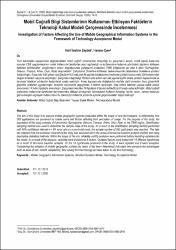| dc.contributor.author | Zeybek, Halil İbrahim | |
| dc.contributor.author | Çam, Handan | |
| dc.date.accessioned | 2021-11-09T20:05:43Z | |
| dc.date.available | 2021-11-09T20:05:43Z | |
| dc.date.issued | 2020 | |
| dc.identifier.issn | 1309-7423 | |
| dc.identifier.uri | https://app.trdizin.gov.tr/makale/TXprM016YzJOZz09 | |
| dc.identifier.uri | https://hdl.handle.net/20.500.12440/5519 | |
| dc.description.abstract | Yeni teknolojiler kapsamında değerlendirilen mobil coğrafi sistemlerinin tartışıldığı bu çalışmanın amacı; mobil olarak kullanıma sunulan CBS uygulamalarının mobil kullanıcılar tarafından nasıl algılandığı ve kullanıcıların kullanım yönündeki algılarını etkileyen faktörleri belirlemektir. Araştırmanın amacı doğrultusunda çalışmanın anakütlesi TR90 bölgesinde yer alan 6 ilden (Gümüşhane, Giresun, Trabzon, Artvin, Ordu, Rize) oluşmaktadır. Çalışmanın Örneklem kütlesinin belirlenmesinde tabakalama örnekleme yöntemi kullanılmıştır. İl bazında %95 güven aralığında e=%5 hata payı ile yapılan tabakalama örnekleme yöntemi sonucunda 200 katılımcıdan oluşan örneklem sayısına ulaşılmıştır. Çalışmanın kapsadığı illerden elde edilen veri seti yapısal eşitlik analiz yöntemi kapsamında ve tanımsal istatiksel yöntemler kullanılarak analiz edilmiştir. Amaç kapsamında değişkenleri modele dahil etmeden önce güvenilirlik geçerlilik analizleri uygulanmıştır. Analizler sonucunda değişkenler 9 faktöre ayrılmıştır. Elde edilen faktörler yapısal eşitlik analizi sonucunda 14 farklı hipotezle sınanmıştır. Çalışmada önerilen 14 hipotezin 6 tanesi reddedilmiş 8 tanesi kabul edilmiştir. Mobil coğrafi sistemlerin kullanıcılar tarafından benimsenmesi dikkate alındığında, teknolojiden kullanım kolaylığı, fayda, uyum, zaman tasarrufu gibi avantajları algılayan kullanıcıların bu teknolojiyi kullanma yönünde eyleme geçebilecekleri tespit edilmiştir. | en_US |
| dc.description.abstract | The aim of this study is to discuss mobile geographic systems evaluated within the scope of new technologies; is determining how GIS applications are perceived by mobile users and factors affecting their perception of usage. For the purpose of the study, the population of the study consists of 6 provinces (Gumushane, Giresun, Trabzon, Artvin, Ordu, Rize) in the TR90 region. Stratification sampling method was used to determine the sample mass of the study. As a result of the stratification sampling method performed with 95% confidence interval e = 5% error rate on a provincial basis, the sample number of 200 participants was reached. The data set obtained from the provinces covered by the study was analyzed within the scope of structural equation analysis method and using descriptive statistical methods. Within the scope of the aim, reliability validity analyzes were performed before including variables into the model. As a result of the analysis, variables were divided into 9 factors. Obtained factors were tested with 14 different hypotheses as a result of structural equation analysis. Of the 14 hypotheses proposed in the study, 6 were rejected and 8 were accepted. Considering the adoption of mobile geographic systems by users, it has been determined that users who perceive the advantages such as ease of use, benefit, adaptability, time saving from technology can take action to use this technology | en_US |
| dc.language.iso | tur | en_US |
| dc.relation.ispartof | Gümüşhane Üniversitesi Sosyal Bilimler Enstitüsü Elektronik Dergisi | en_US |
| dc.rights | info:eu-repo/semantics/openAccess | en_US |
| dc.subject | [No Keywords] | en_US |
| dc.title | Mobil Coğrafi Bilgi Sistemlerinin Kullanımını Etkileyen Faktörlerin Teknoloji Kabul Modeli Çerçevesinde İncelenmesi | en_US |
| dc.title.alternative | Investigation of Factors Affecting the Use of Mobile Geographical Information Systems in the Framework of Technology Acceptance Model | en_US |
| dc.type | article | en_US |
| dc.relation.publicationcategory | Makale - Ulusal Hakemli Dergi - Kurum Öğretim Elemanı | en_US |
| dc.department | Fakülteler, İktisadi ve İdari Bilimler Fakültesi, Yönetim Bilişim Sistemleri Bölümü | en_US |
| dc.identifier.volume | 11 | en_US |
| dc.identifier.issue | Ek | en_US |
| dc.identifier.startpage | 14 | en_US |
| dc.contributor.institutionauthor | Çam, Handan | |
| dc.identifier.endpage | 26 | en_US |


















